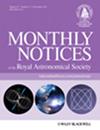B/PS bulges and barlenses from a kinematic viewpoint. I
IF 4.7
3区 物理与天体物理
Q1 ASTRONOMY & ASTROPHYSICS
引用次数: 0
Abstract
A significant part of barred disc galaxies exhibits boxy/peanut-shaped structures (B/PS bulges) at high inclinations. Another structure also associated with the bar is a barlens, often observed in galaxies in a position close to face-on. At this viewing angle, special kinematic tests are required to detect a 3D extension of the bars in the vertical direction (B/PS bulges). We use four pure N-body models of galaxies with B/PS bulges, which have different bar morphology from bars with barlenses to the so-called face-on peanut bars. We analyse the kinematics of our models to establish how the structural features of B/PS bulges manifest themselves in the kinematics for galaxies at intermediate inclinations and whether these features are related to the barlenses. We apply the dissection of the bar into different orbital groups to determine which of them are responsible for the features of the LOSVD (line-of-sight velocity distribution), i.e., for the deep minima of the h4 parameter along the major axis of the bar. As a result, we claim that for our models at the face-on position, the kinematic signatures of a ‘peanut’ indeed track the vertical density distribution features. We conclude that orbits responsible for such kinematic signatures differ from model to model. We pay special attention to the barlens model. We show that orbits assembled into barlens are not responsible for the kinematic signatures of B/PS bulges. The results presented in this work are applicable to the interpretation of IFU observations of real galaxies.从运动学角度来看,B/PS凸起和杆状透镜。我
棒盘星系的很大一部分在高倾角处呈现出方形/花生状结构(B/PS凸起)。另一个与棒有关的结构是棒透镜,通常在靠近表面的星系中观察到。在这个视角下,需要进行特殊的运动学测试来检测钢筋在垂直方向上的3D延伸(B/PS凸起)。我们使用了四个B/PS凸起星系的纯N体模型,它们具有不同的棒状形态,从带棒状透镜的棒状到所谓的花生棒上的面。我们分析了我们模型的运动学,以确定B/PS凸起的结构特征如何在中等倾角星系的运动学中表现出来,以及这些特征是否与棒透镜体有关。我们将棒划分为不同的轨道组,以确定它们中的哪一个负责LOSVD(视线速度分布)的特征,即沿着棒的主轴的h4参数的深度最小值。因此,我们声称,对于我们在正面位置的模型,“花生”的运动学特征确实跟踪了垂直密度分布特征。我们得出的结论是,负责这种运动学特征的轨道因模型而异。我们特别注意barlens模型。我们证明,组装成杆状透镜的轨道对B/PS凸起的运动学特征不负责。这项工作中提出的结果适用于解释IFU对真实星系的观测。
本文章由计算机程序翻译,如有差异,请以英文原文为准。
求助全文
约1分钟内获得全文
求助全文
来源期刊

Monthly Notices of the Royal Astronomical Society
ASTRONOMY & ASTROPHYSICS-
CiteScore
9.10
自引率
37.50%
发文量
3198
审稿时长
3 months
期刊介绍:
Monthly Notices of the Royal Astronomical Society is one of the world''s leading primary research journals in astronomy and astrophysics, as well as one of the longest established. It publishes the results of original research in positional and dynamical astronomy, astrophysics, radio astronomy, cosmology, space research and the design of astronomical instruments.
 求助内容:
求助内容: 应助结果提醒方式:
应助结果提醒方式:


